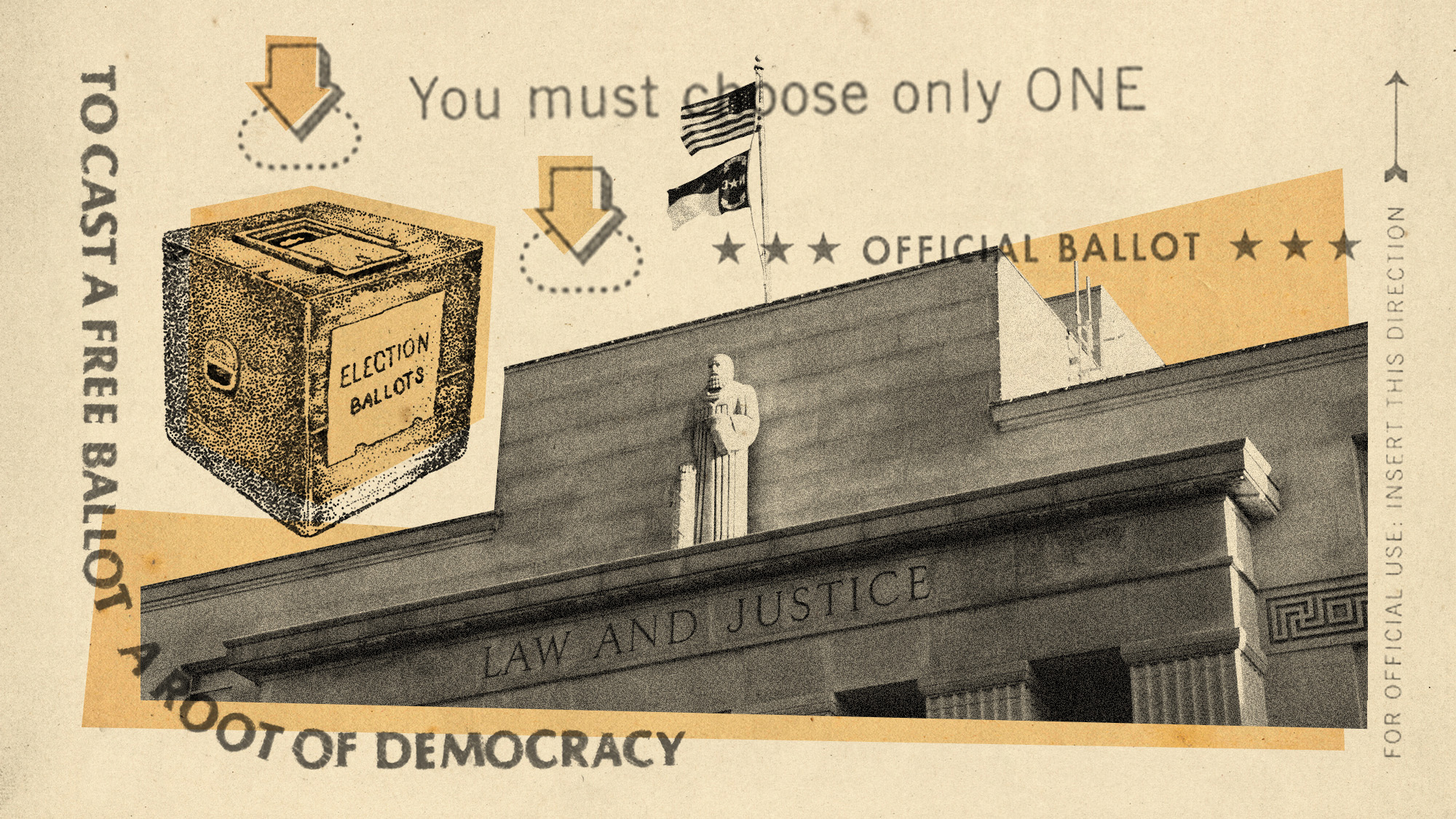North Carolina Supreme Court risks undermining its legitimacy
A contentious legal battle over whether to seat one of its own members threatens not only the future of the court's ideological balance, but its role in the public sphere


A free daily email with the biggest news stories of the day – and the best features from TheWeek.com
You are now subscribed
Your newsletter sign-up was successful
Narrow statewide elections are hardly a new phenomenon in the history of American politics. Long have office-holders assumed their roles in public service after razor-thin races, at times pushing the country's electoral norms to their limits. Recounts, contested results and an increasing trend of refusing to concede have all been incorporated into the electoral system.
In North Carolina, however, the state's latest elections have entered uncharted — and for many law scholars, uncomfortable — territory. There, the state's GOP-led Supreme Court has temporarily blocked the certification to reseat incumbent Democratic Justice Allison Riggs, overruling the Democratic-majority Board of Elections, which determined her 734-vote lead over Republican challenger Jefferson Griffin after two recounts. Now, the "very court which Griffin aims to join" will not only hear his challenge to tens of thousands of votes cast, but could very well "decide a winner in the race," said North Carolina's The News & Observer — all while providing "scant comment about its reasoning" for blocking Riggs' certification to begin with (Riggs had recused herself from last week's ruling).
Damaging the 'integrity of the election process'
At its core, Griffin's argument centers on his claim that around 60,000 ballots cast across every one of North Carolina's 100 counties were done so by voters who had not "provided election officials with their driver’s license number or the last four digits of their Social Security number," The Washington Post said. His "unprecedented" request to reject those ballots is largely "based on a theory that has been dismissed by both the state election board and a federal judge," ProPublica said, with officials finding "many legitimate reasons for that information to be missing, including voters registering before state paperwork was updated about a year ago to require those details."
The Week
Escape your echo chamber. Get the facts behind the news, plus analysis from multiple perspectives.

Sign up for The Week's Free Newsletters
From our morning news briefing to a weekly Good News Newsletter, get the best of The Week delivered directly to your inbox.
From our morning news briefing to a weekly Good News Newsletter, get the best of The Week delivered directly to your inbox.
Richard Dietz, the court's lone Republican dissenting justice, acknowledged that "while he may ultimately agree with some of Griffin’s claims," it was ultimately "too late to bring the case," said The News & Observer. Operating under a "legal doctrine known as the 'Purcell principle,'" Dietz concluded that any judicial intervention "becomes inappropriate because it can damage the integrity of the election process," NBC said. "The harm this type of post-election legal challenge could inflict on the integrity of our elections is precisely what the Purcell principle is designed to avoid," said Dietz in his dissent.
'Major implications down the road'
The battle over Riggs' seat is "part of the power struggle that has long animated North Carolina politics," said Vox. It follows "congressional gerrymandering meant to favor the GOP, legal maneuvering weakening the power of incoming Democratic officials, and the establishment of a GOP supermajority in North Carolina’s legislature in 2023." Given the lopsided partisan makeup of North Carolina politics, Riggs' seat and the fight over it "has major implications down the road," said Billy Ball at MSNBC. Riggs' loss would make it "nearly impossible for Democrats to retake the majority on the state Supreme Court before the next redistricting in 2030." Siding with Griffin could also establish a precedent in which trailing candidates "challenge the rules that were in place for elections and get votes retroactively discarded," said Ann Webb, the policy director for Common Cause North Carolina, to ProPublica. "If there’s a never-ending process of challenging election rules and results after the fact, our entire system could come to a standstill."
"If the Court does gamble with our votes to save Griffin, does it open the door for them to invalidate more election results?" said J. Sailor Jones, the associate director of Common Cause North Carolina, at NC Newsline. "If the Court calls for a new election, will North Carolinians vote for a Justice who would so easily silence their voices for their own best interests?"
A free daily email with the biggest news stories of the day – and the best features from TheWeek.com
Rafi Schwartz has worked as a politics writer at The Week since 2022, where he covers elections, Congress and the White House. He was previously a contributing writer with Mic focusing largely on politics, a senior writer with Splinter News, a staff writer for Fusion's news lab, and the managing editor of Heeb Magazine, a Jewish life and culture publication. Rafi's work has appeared in Rolling Stone, GOOD and The Forward, among others.
-
 Political cartoons for February 21
Political cartoons for February 21Cartoons Saturday’s political cartoons include consequences, secrets, and more
-
 Crisis in Cuba: a ‘golden opportunity’ for Washington?
Crisis in Cuba: a ‘golden opportunity’ for Washington?Talking Point The Trump administration is applying the pressure, and with Latin America swinging to the right, Havana is becoming more ‘politically isolated’
-
 5 thoroughly redacted cartoons about Pam Bondi protecting predators
5 thoroughly redacted cartoons about Pam Bondi protecting predatorsCartoons Artists take on the real victim, types of protection, and more
-
 ‘Poor time management isn’t just an inconvenience’
‘Poor time management isn’t just an inconvenience’Instant Opinion Opinion, comment and editorials of the day
-
 Kurt Olsen: Trump’s ‘Stop the Steal’ lawyer playing a major White House role
Kurt Olsen: Trump’s ‘Stop the Steal’ lawyer playing a major White House roleIn the Spotlight Olsen reportedly has access to significant US intelligence
-
 Japan’s Takaichi cements power with snap election win
Japan’s Takaichi cements power with snap election winSpeed Read President Donald Trump congratulated the conservative prime minister
-
 Supreme Court upholds California gerrymander
Supreme Court upholds California gerrymanderSpeed Read The emergency docket order had no dissents from the court
-
 How realistic is the Democratic plan to retake the Senate this year?
How realistic is the Democratic plan to retake the Senate this year?TODAY’S BIG QUESTION Schumer is growing bullish on his party’s odds in November — is it typical partisan optimism, or something more?
-
 How robust is the rule of law in the US?
How robust is the rule of law in the US?TODAY’S BIG QUESTION John Roberts says the Constitution is ‘unshaken,’ but tensions loom at the Supreme Court
-
 Why do Republicans fear immigration raids in North Carolina?
Why do Republicans fear immigration raids in North Carolina?Today’s Big Question Trump’s aggressive enforcement sparks backlash worries
-
 The ‘Kavanaugh stop’
The ‘Kavanaugh stop’Feature Activists say a Supreme Court ruling has given federal agents a green light to racially profile Latinos
